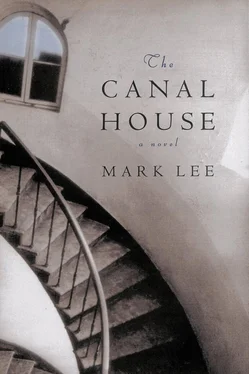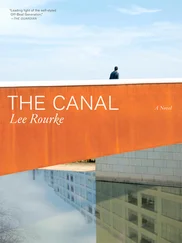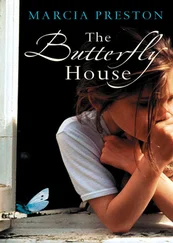After using the bathroom, I noticed a full-color photograph on the wall. It was a picture of the room. Same bed. Same book shelves. No, I thought. That’s not it. There was only one window in my room, but a pair of windows in the photograph. A little brass label at the bottom of the frame read THE PRIORY. KILKENNY, IRELAND.
Then I realized: Richard, or someone working for him, had bought up the entire contents of a room in Ireland and installed it, intact, at Westgate Castle. It was as if a natural history museum had set up a reconstructed hut from the Amazon basin. Lots of people collect antiques, but having the photograph in the room was something new. Did Richard think his guests would be interested? Or was it simply a demonstration of his wealth and power, the fact that he could grab a little fragment of the world and make it appear anywhere he wished? Staring at the photograph, I realized that Daniel, the Armenian poet, and I had been collected in exactly the same manner.
AROUND SEVEN O’CLOCK I walked down the hallway to see Daniel. A framed photograph of his room hung on the wall and I wondered if his furniture had also come from the house in Kilkenny. Daniel was wearing one of his Italian suits and an ivory-colored shirt with an open collar. He looked like he was going to sit outside at a café and order a glass of wine.
“Want to get a drink downstairs?”
“Sure. In a few minutes.” Daniel stepped into the bathroom and combed his wet hair. He moved quickly as if our new surroundings had awakened him from a long sleep. “This is a very strange place, Nicky. It’s like a stage set with real people bumping into the scenery. I can’t see Julia living here.”
“Well, she does. At least for this weekend. Maybe her room is a recreation of a medical tent in northern Uganda.”
“You think she’s happy here?”
“All this is Richard. If you pick the man, you get the castle.”
We went downstairs and found a maid lighting candles. She led us down a long hallway to a frosted glass door with rubber seals around the edges. The door made a faint whooshing sound when she pulled it open. Daniel and I passed through an anteroom warmed by an electric heater. We pushed open a second door and entered a conservatory with a twenty-foot ceiling.
The glass-walled room was filled with potted trees and flowering plants. Overstuffed couches and chairs had been brought in from another part of the house. Digran Petrosyan, the Rivertons, and the Barthorps were already there, talking to each other like old friends. Billy Monroe stood in one corner behind a wooden serving cart filled with bottles of wine and liquor.
We walked over to get a drink and he gave us a benevolent smile. Although Billy was making drinks for the guests, he didn’t act like Wallace or the other servants. This might have been Richard’s party, but Billy felt connected to what was going on.
“How are your rooms?” he asked. “Everything satisfactory?”
“Very nice,” I said.
“You have any problems, anything you need, just talk to me. Whatever you do, don’t bother Mr. Seaton. He’s got a lot of things on his mind this weekend.”
I ordered an Irish whiskey and Daniel asked for Campari and soda. After we got our drinks, I followed Daniel over to a potted palm tree where Digran Petrosyan was talking to Connie Barthorp, the MP’s wife.
“I just asked Digran if he was ever tortured in prison. He said—”
“I wasn’t.” The poet looked like his teeth hurt.
“But other people were. He could hear their screams.” Connie rattled the ice cubes in her glass. “Isn’t that horrible?”
The glass door opened, and Richard and Julia entered the room. She wore a black dress and her hair was coiled up at the back of her neck. If I had brought along my camera, I would have raised it at that moment.
Daniel ignored them and focused on Digran Petrosyan. “Do you regret being let out of prison?”
The poet looked startled, as if Daniel had just read his mind. Connie Barthorp shook her head. “What a horrible thing to say! Mr. Petrosyan was in a dreadful situation. It took three international petitions and a personal appeal from the prime minister to get him released.”
“If you don’t mind, Mrs. Barthorp, I can speak for myself.” Digran stood a little straighter. “You must understand that I would not have survived another year in prison. It was very cold and dirty and people were dying of typhoid. But, in another way, I do regret leaving the place. When I was alone in my cell, I was aware of everything around me. I could look at a spider and see the world.”
“But aren’t you grateful that you’re in Britain among friends?” Connie asked. “At least, you said that earlier.”
“Yes. Very grateful.”
“Being released must have been an enormous surprise.”
“Not really. When they moved me to the new cell, I was allowed to hear the warden’s radio. I listened to Mrs. Riverton’s interview on the BBC.”
“You heard Jax? On the radio? Oh, you should definitely tell her that. She’ll be thrilled.”
Before Digran could object, Connie linked her arm in his and led him across the room to Jax Riverton. I glanced at Daniel as he pulled a petal from a flowering cherry tree.
“How did you know he didn’t want to get out of prison?”
“It’s obvious, Nicky.”
“It wasn’t obvious to me.”
“Digran isn’t comfortable here. He used to be a poet and now he’s a foreign-policy success.”
Richard and Julia had split up and were standing in different areas of the conservatory. Holding a glass of white wine, Julia left Malcolm Barthorp and approached the cherry tree. She smiled at both of us, but her eyes lingered a bit longer on Daniel.
“Is everything all right?” Julia asked. “If you don’t like your own room, Wallace will move you to another one.”
“Who gets the round tower?” I asked.
“No one. Richard has his office there.”
“How’s the water pump at Kosana?” Daniel asked.
Julia touched her gold necklace. The relief camp was thousands of miles away. “It could be broken again, but there’s nothing I can do about it. I’m a doctor with no patients. My only responsibility these days is to be charming to our friends and donors.”
“You’re doing a very good job.”
“You think so? It’s strange to see you and Nicky here. I feel like you two should be covering a story.”
“Billy gave us our instructions,” I said. “Everything that happens this weekend is off the record.”
“So I can say anything I want to you?”
“Yes,” Daniel said. “Anything at all.”
Julia glanced up at the branch of white cherry blossoms hanging over our heads. “I don’t know what I think about having these plants here. It’s cold and dark outside, and yet here’s a cherry tree waiting vainly for bumblebees that died two months ago.” She glanced at me. “Is it beautiful or pathetic, Nicky?”
“I don’t know.”
“The flowers are beautiful no matter what season it is,” Daniel said. “It doesn’t change anything because it’s October.”
“But they shouldn’t be here,” Julia said. “It’s silly and artificial.”
I heard a beeping sound and Billy took a cell phone out of his pocket. He talked to someone, then announced that dinner was being served and led us down a corridor to the Great Hall. The dining room was massive; it had a vaulted ceiling, a fireplace that was big enough to roast a Volkswagen, and a long stained-glass window. There were place cards written in a graceful cursive. Richard and Julia sat at opposite ends of the table, like the king and his consort. Daniel and I were placed beside Julia. Jax Riverton was to my left.
Sitting among this grandeur, it was comforting to be served such a mediocre dinner. Richard was a man who concentrated on the details, but I guess he wasn’t interested in food. The tomato bisque tasted like spaghetti sauce. The lamp chops were stringy and tough, and the broccoli had been boiled until it was limp. The wine, however, was excellent, and Wallace kept bringing out new bottles.
Читать дальше












